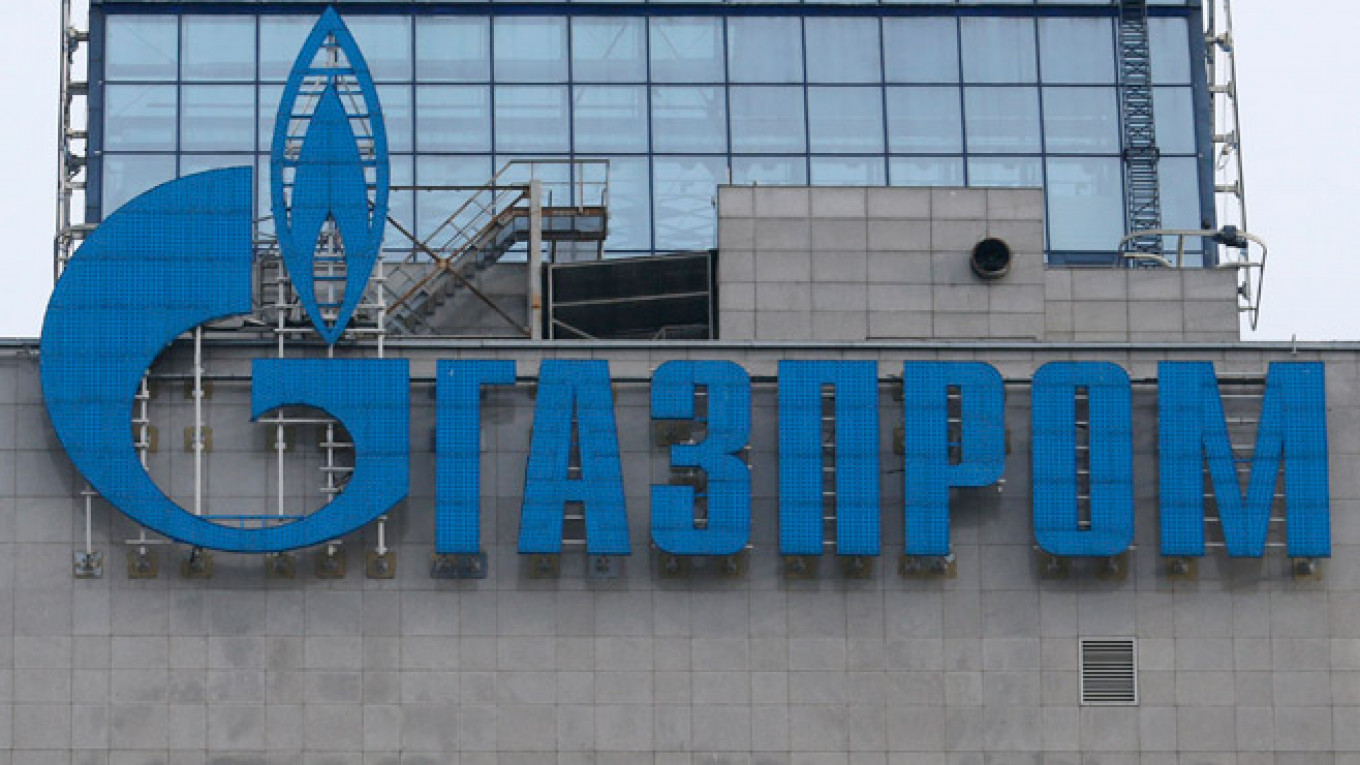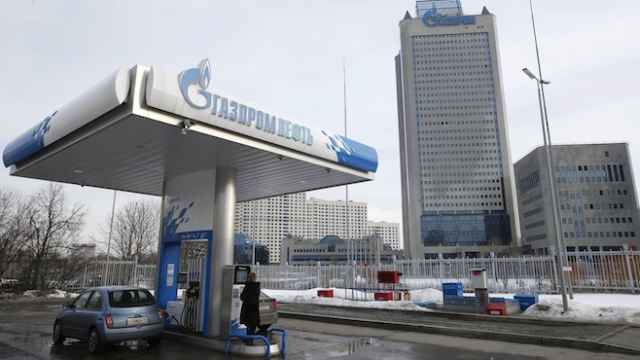Gazprom, the giant natural gas company that traditionally provides around a fifth of Russia’s budget revenue, is facing a challenging year.
The state-owned company is confronting slumping revenues from its key European export market, a “black hole” in Ukraine and massive debt inflation due to the steep devaluation of Russia’s ruble over the past year.
Added to these problems, sanctions imposed over Moscow’s actions in Ukraine have restricted Gazprom’s access to Western capital and advanced equipment, just as the company embarks on a massive infrastructure development drive aimed at restructuring its approach to Europe and entering the rising Asian market.
As a result analysts expect the firm to see its earnings continue to slide well into 2016.
Still, Gazprom is unlikely to suffer long-term losses, thanks to a $400 billion gas deal penned with China last year.
The company will remain what President Vladimir Putin described as “a powerful lever of political and economic influence in the world” — although its clout may be diminished for some time.
Revenue Crunch
Gas prices to Europe, Gazprom’s core market, are set to decline 35 percent this year, severely narrowing the company’s sales margins.
Regulation forces Gazprom to sell gas inside Russia cheaply, so the company earns most of its cash through exports.
The bulk of Gazprom’s supply contracts are linked to oil prices, with a typical delay of six to nine months. Since last summer Brent crude oil has halved in value from a high of $115 per barrel to around $55 per barrel.
Oil’s steepest falls came toward the end of last year, meaning the full effect on Gazprom’s sales will strike only later this year and continue into 2016, Alfa Bank analyst Alexander Kornilov said.
European customers are also better able to negotiate price cuts, thanks to efforts to limit Europe’s energy dependence on Russia. Liquefied natural gas imports to Europe will cap Gazprom’s sales growth and drive down prices further, according to a January report by Credit Suisse.
Many European consumers are seeking to restructure Gazprom contracts around hub-based spot pricing, which is currently cheaper than oil-indexed contracts.
Added to the mix is Ukraine, which Kornilov called “a black hole” in terms of forecasting.
It is unclear how much gas Ukraine will purchase off Russia this year and at what price. Ukraine’s economic crisis and civil war in the east saw demand drop by one-fifth by the end of last year, and a pricing and debt repayment dispute between Kiev and Gazprom could lead to Russia cutting Ukraine’s gas supply, as it did last summer.
On the upside, Gazprom’s sales abroad, which are denominated mostly in foreign currencies, will inflate due to ruble depreciation, at least in the short term.
But a Gazprom return to pre-2014 earnings will be slow and depend greatly on when oil prices rise.
Competition from the United States, which is gearing up to become a key supplier of LNG in Europe, will also limit any significant gains the company receives from its traditional market.
Contracts with China will be essential for a recovery, Kornilov notes, although they won’t have a serious impact on revenues for at least another five years, as it will take time to raise exports to the full-contract level of 38 billion cubic meters a year.
Growing Expenditure
Last month, Gazprom announced a 21 percent cut in 2015 capital expenditure to $30 billion, echoing similar reductions in investment across the global energy sector due to cheap oil.
But the company has claimed to investors this will have little impacts on planned projects in the upcoming year.
Gazprom CFO Andrei Kruglov told television station Rossia-24 last month that the firm would be able to fund projects even if oil prices dipped to between $30 and $40 per barrel.
“The company will be ready to implement all of its investment plans even at such oil prices” he said.
A key reason for this is the fall of the ruble, which has tumbled over 40 percent against the U.S. dollar since last summer. Gazprom says 80 percent of its operational costs are ruble-denominated, so looking at the dollar price of oil is “misleading,” said Yevgeny Solovyov, an analyst at Societe Generale.
Gazprom is building the Power of Siberia pipeline to China after signing a 30-year gas supply deal worth $400 billion in Beijing last May. Construction is set to start this year and will cost over $20 billion. Meanwhile, work on a “Turkish Stream,” pipeline connecting Russia to Turkey via the Black Sea could also start as early as the end of 2015, depending on the length of the planning phase.
“I don’t expect to see any significant spending cuts on these projects,” said Kornilov, although he warned that smaller projects could be delayed.
Debt Inflation
But if ruble devaluation softens the effect of export price falls, it has inflated Gazprom’s debt, which is mostly denominated in U.S. dollars and euros.
At the end of September, Gazprom’s net debt stood at 1.27 trillion rubles ($20 billion), a 14 percent rise in ruble terms from the end of 2013.
But the Russian currency has since lost one-third of its value, meaning the company’s debt could climb far higher as measured in rubles.
Yet Gazprom’s core EBITDA earnings are estimated to total $43.8 billion last year, according to Credit Suisse, putting the company in a far better position than Rosneft, the state-owned Russian oil giant, which is struggling with a $60 billion debt mountain that is higher than the company’s net market value.
Gazprom, excluding its oil-focused subsidiary Gazprom Neft, also benefits from easier access to Western financial markets than Rosneft and other Russian energy firms that have been targeted by sanctions.
“Foreign markets are still pretty open for Gazprom,” said Kornilov, as evidenced by the signing of short-term loan agreements with two Italian banks late last year. Loans worth 740 million euros ($785 million) were agreed with UniCredit in December and Milan-based Intesa Sanpaolo in January.
But although Gazprom has not been sanctioned, it still faces higher costs due to market wariness of Russia.
“All Russian companies are facing a lot more delays, scrutiny and diligence with Western bankers in agreeing to new loans, so there will be delays and increased costs,” said Societe Generale’s Solovyov.
Contact the author at [email protected]
A Message from The Moscow Times:
Dear readers,
We are facing unprecedented challenges. Russia's Prosecutor General's Office has designated The Moscow Times as an "undesirable" organization, criminalizing our work and putting our staff at risk of prosecution. This follows our earlier unjust labeling as a "foreign agent."
These actions are direct attempts to silence independent journalism in Russia. The authorities claim our work "discredits the decisions of the Russian leadership." We see things differently: we strive to provide accurate, unbiased reporting on Russia.
We, the journalists of The Moscow Times, refuse to be silenced. But to continue our work, we need your help.
Your support, no matter how small, makes a world of difference. If you can, please support us monthly starting from just $2. It's quick to set up, and every contribution makes a significant impact.
By supporting The Moscow Times, you're defending open, independent journalism in the face of repression. Thank you for standing with us.
Remind me later.






